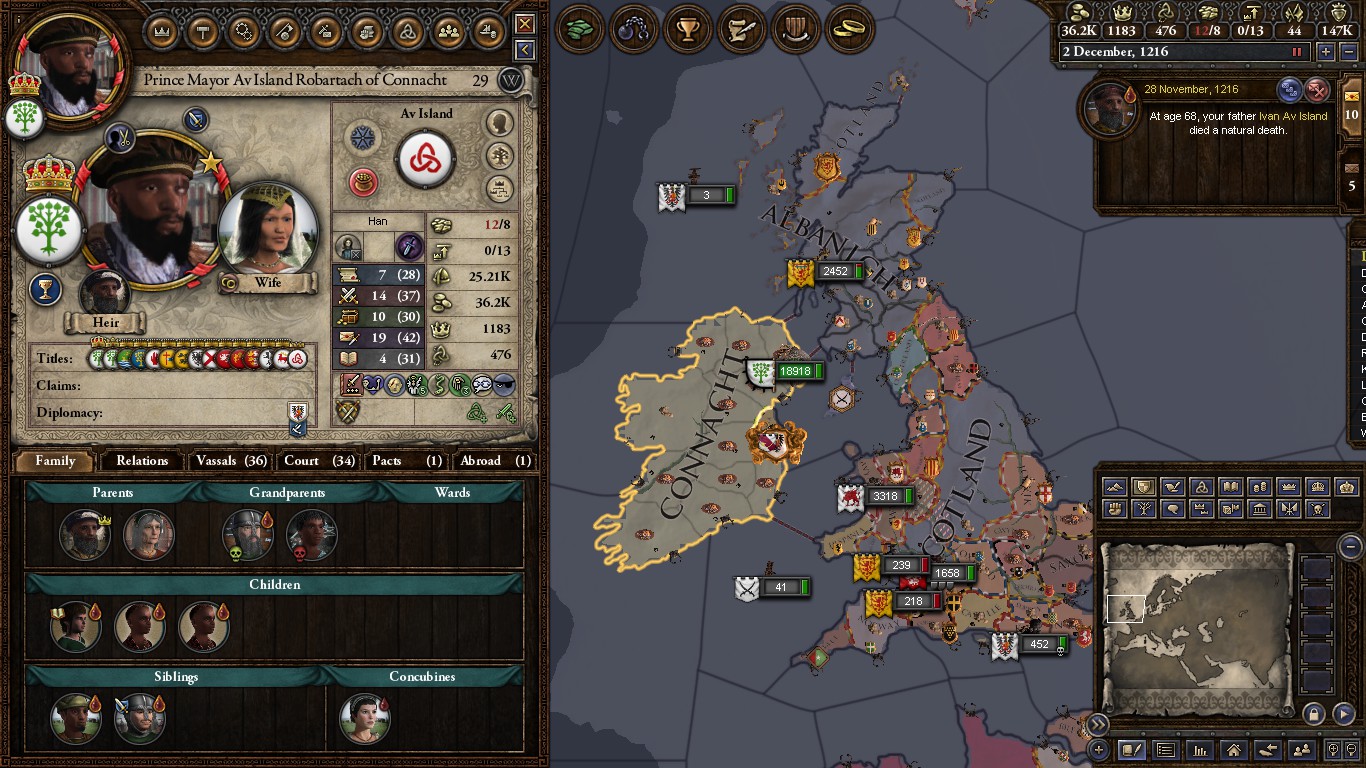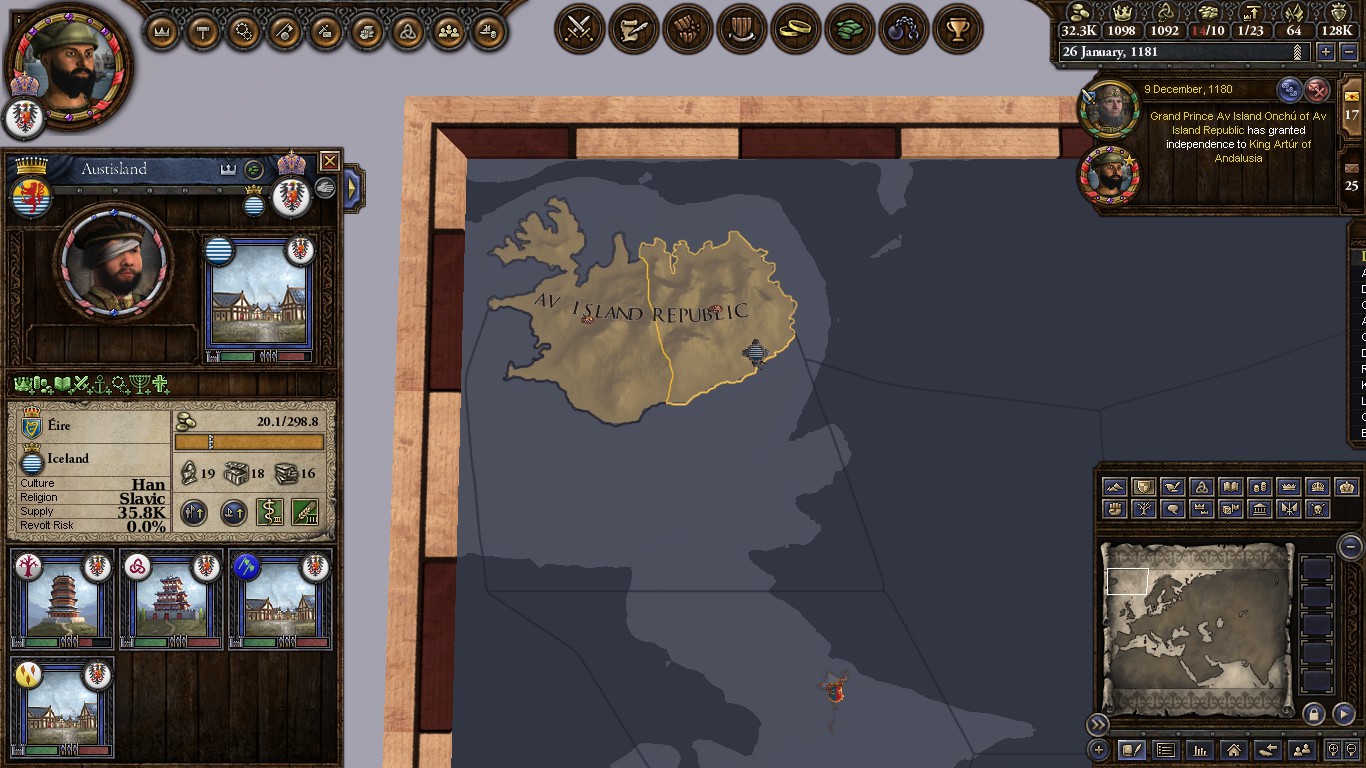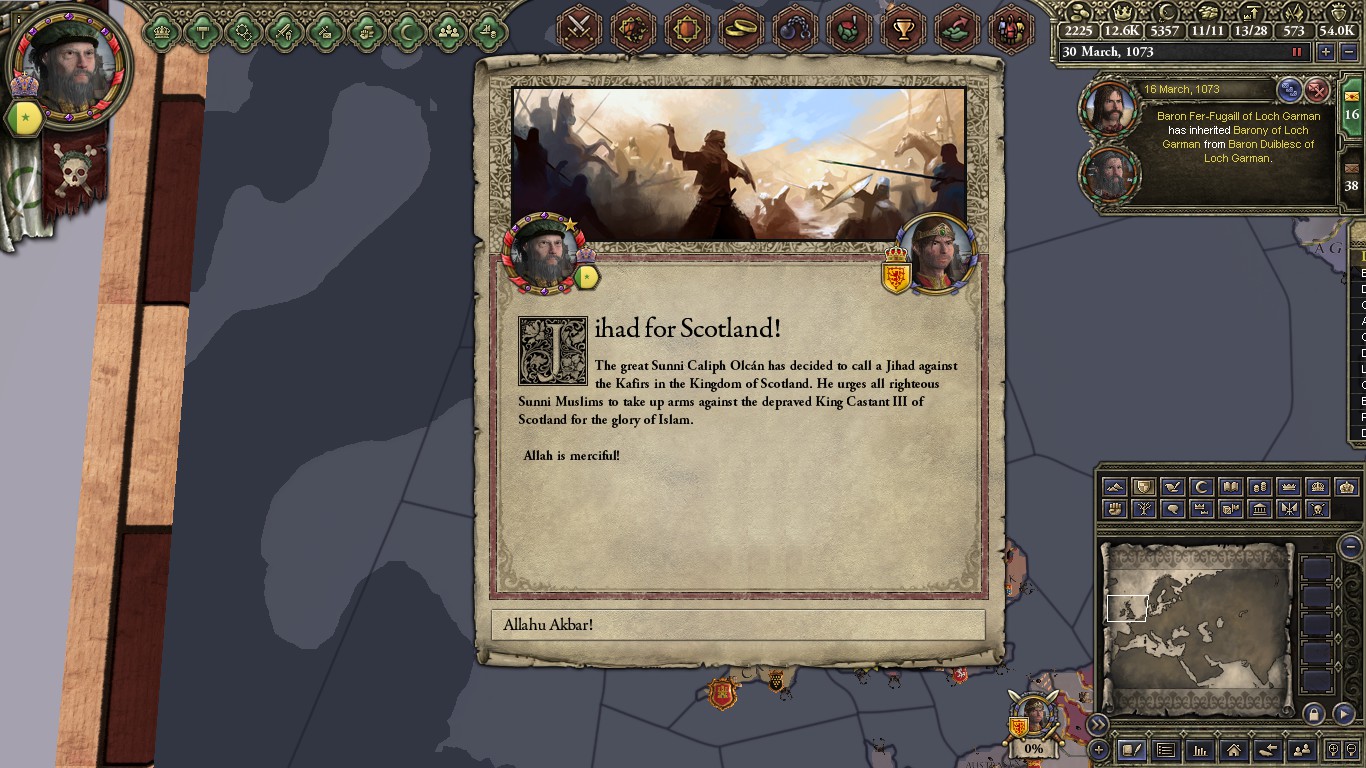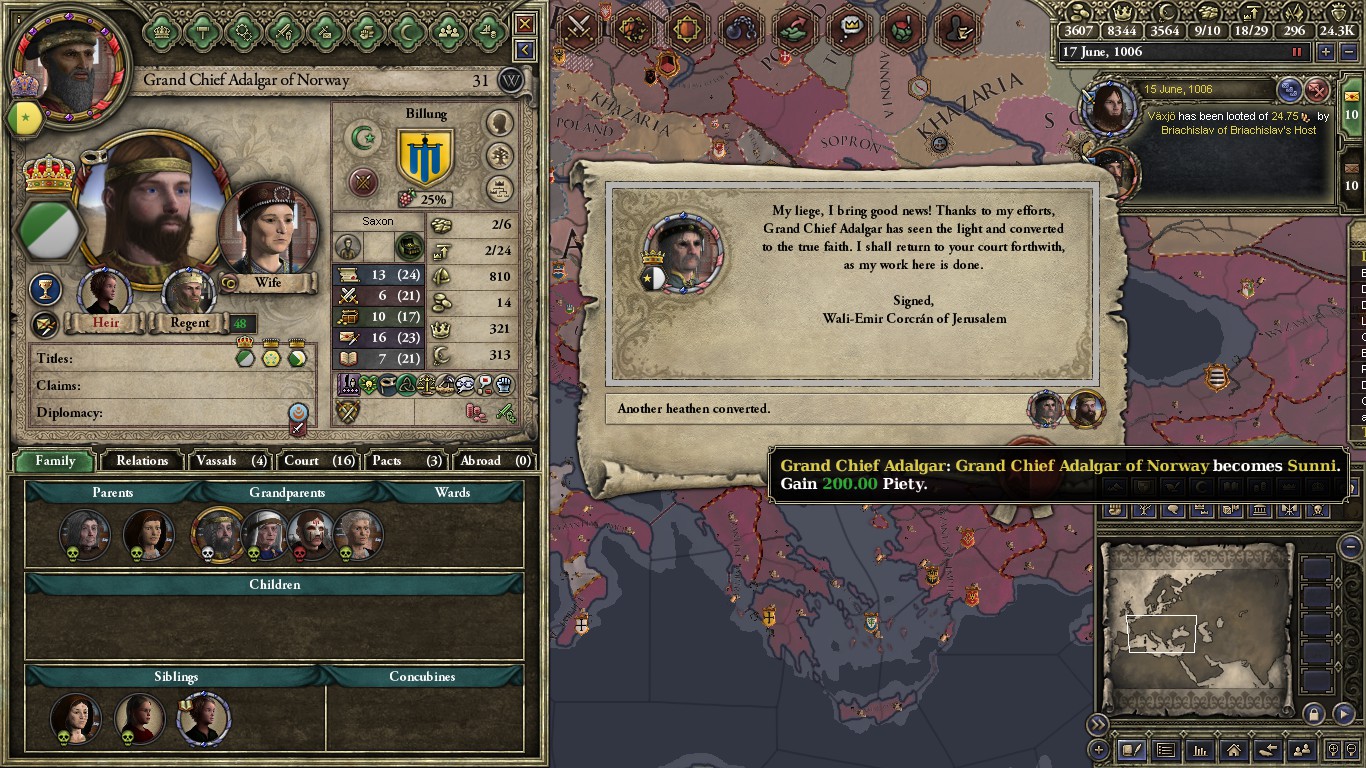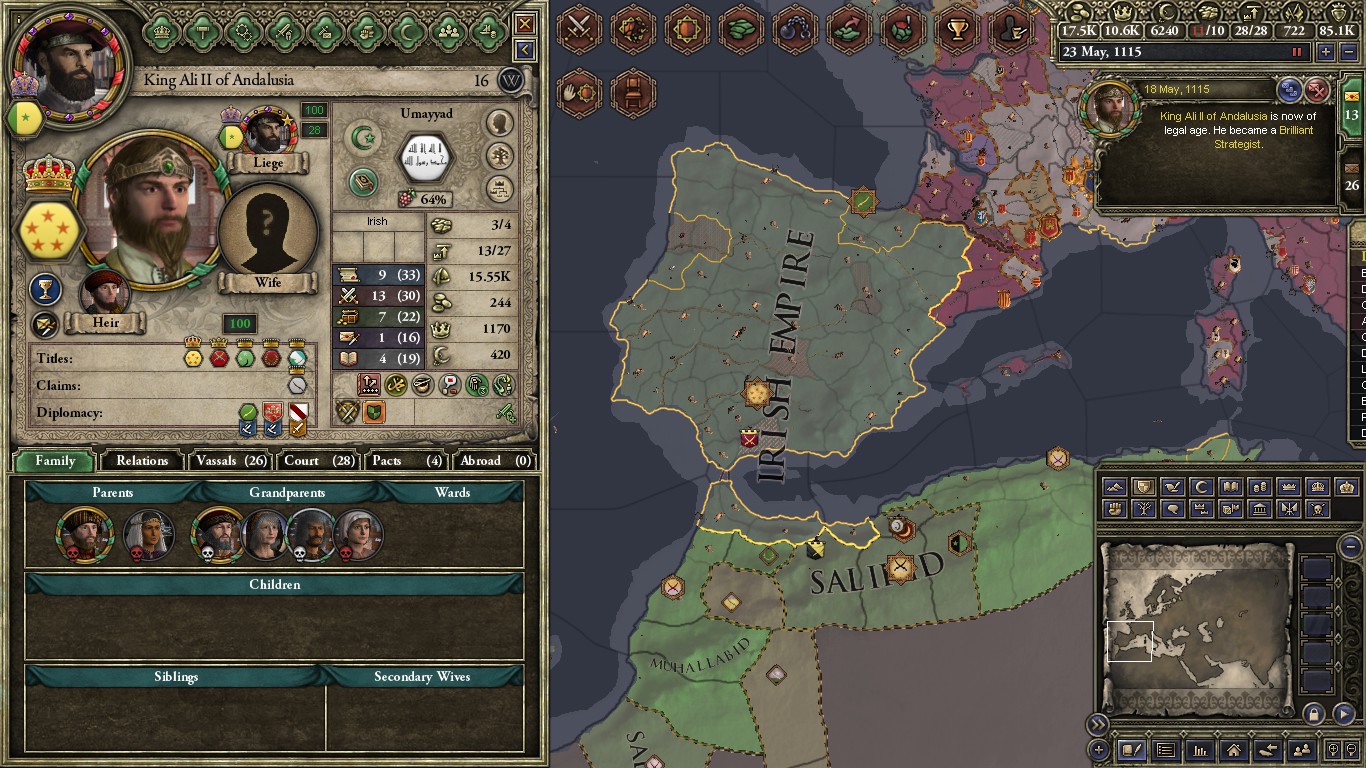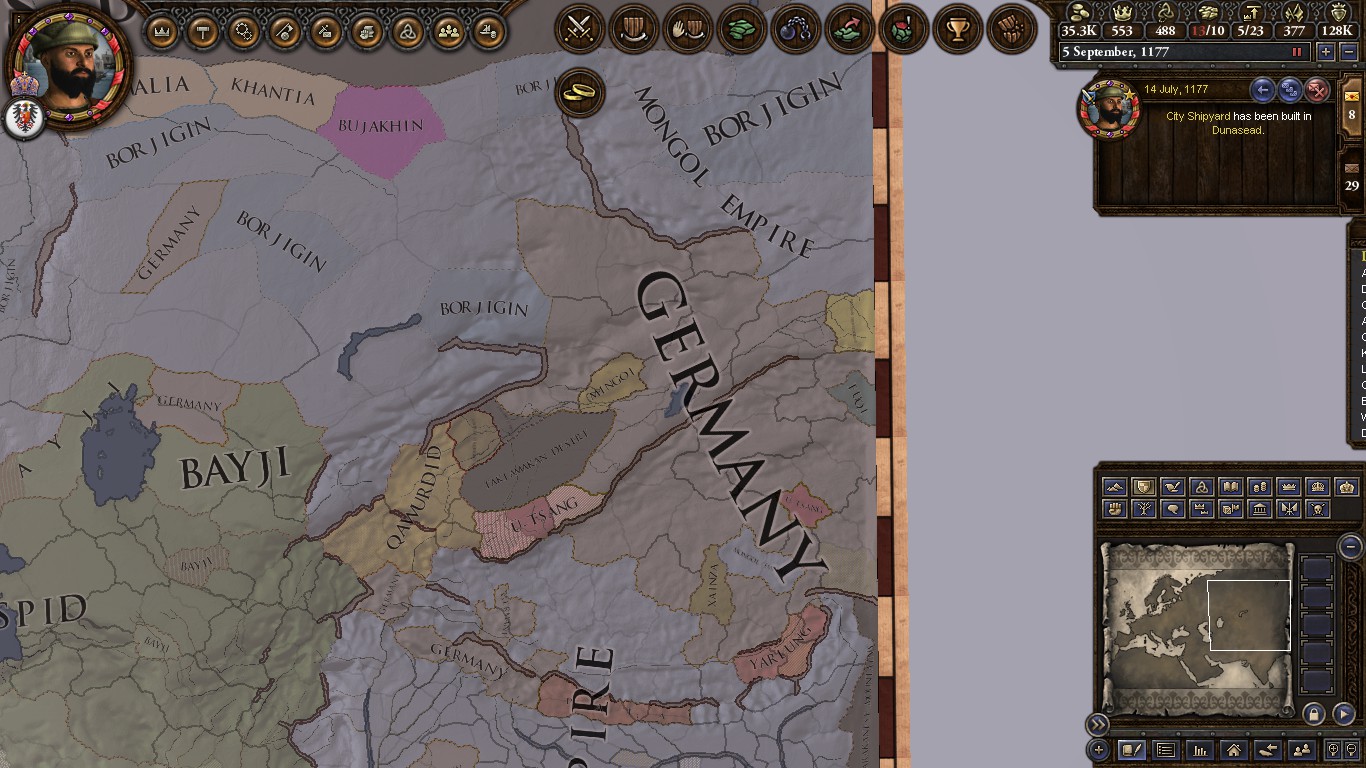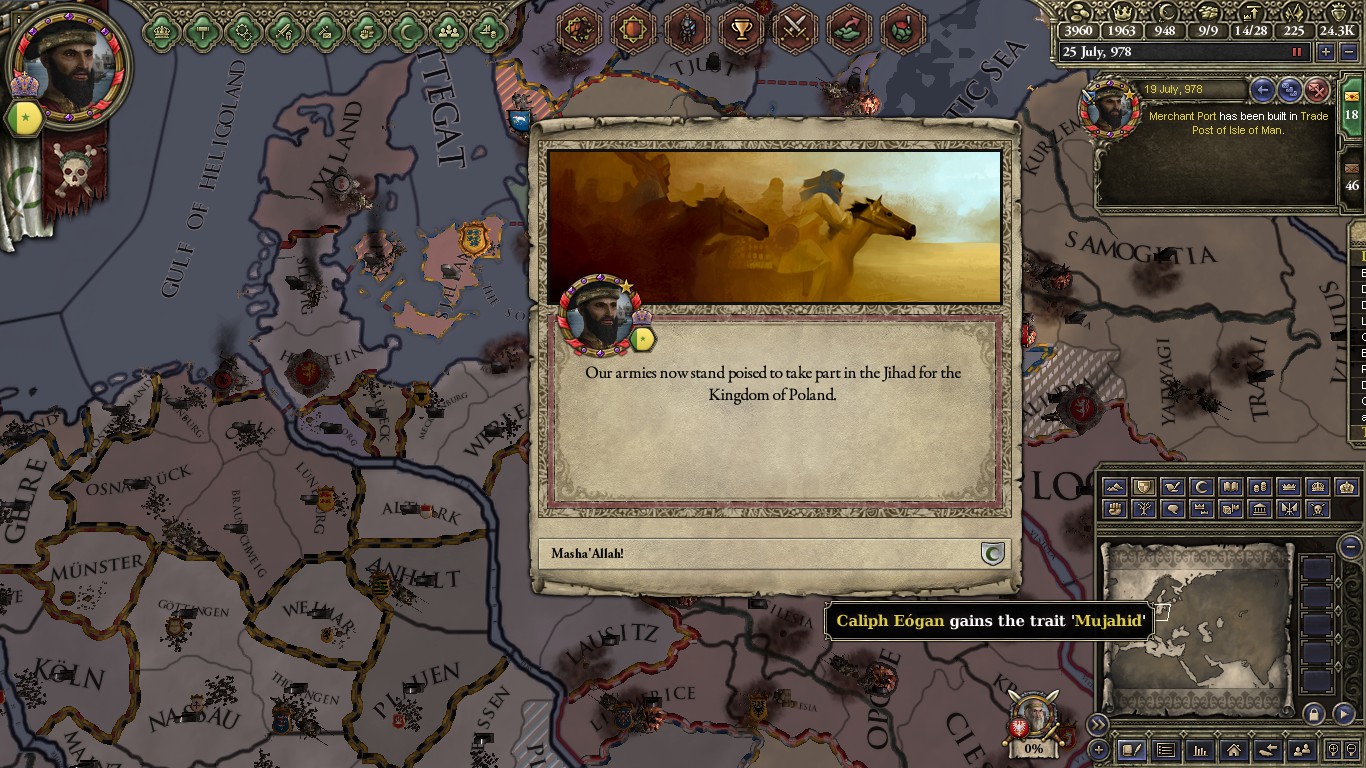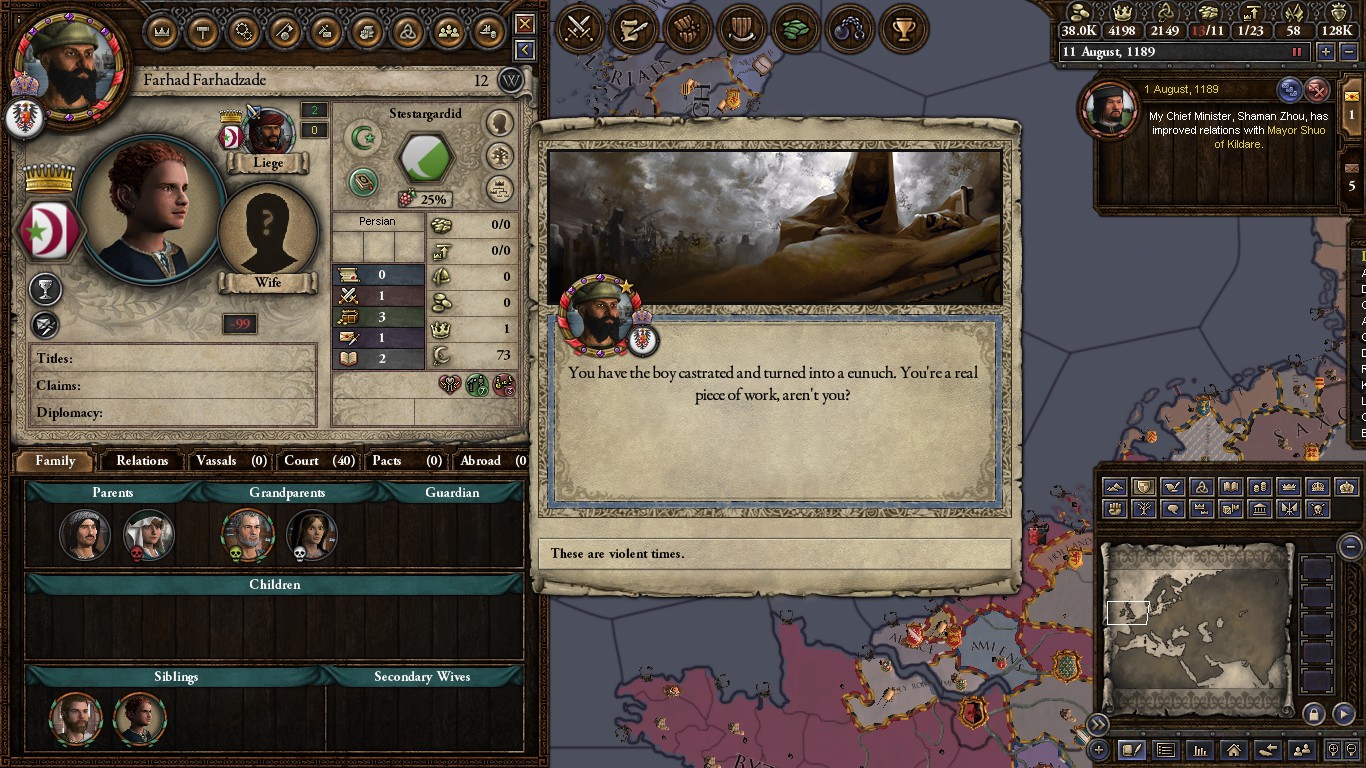Greetings, everyone.
Well then, this is going to be a long one...
The old elective succession system has been succeeded
So your cousin the Duke of Burgundy always seem to nominate the Steve ‘the drunkard’ as the next Emperor of the realm rather than your favorite quick and attractive son. This has been a common theme for a bunch of our playthroughs while having the elective succession laws active for our main titles. One of the biggest problems about this is that the other electors reasonings for their nomination decisions has been hidden away in an opaque box so you never know which electors can be influenced to see things more in your way.
This was one of the first problems we wanted to address when we decided to rework the elective succession system. So instead of just giving you a list of names in the tooltips for whom casted votes on a given candidate we made a specific interface to enable us to give you a more detailed view into the minds of the powerful electors of the realm.

After it was possible to get a better look at why the electors made their decisions we wanted to make it easier to further edit the underlying factors which governs the AI. Therefor we decided to replicate the old logic from hardcoded conditions to instead be based on a scripted system which decides various rules of how the elective succession works.
This not only enables modding of the elective succession law, we now also allow you to create any number of your own elective rules to fill the world with different electorates that play by their own criterias. Maybe you always wanted to create your own technocratic republic that is governed only by the most learned people of the realm. The party realm might only allow drunkards and hedonists to have a say in whom should be this years party host.
For the people that are more interested in exactly how this is modifiable there’s a brief rundown of the syntax used to define the elective rules here:
In addition to these underlying code changes of the elective succession forms we also added another usage of the Conclave favors so that you now can force electors to vote in compliance with your vote for the succession of a title.
Revamped Elective Laws
The unhardcoding of Elective successions allowed us to completely rewrite the AI behavior for the existing Elective laws accessible through the base game (Feudal Elective, Elective Gavelkind, Tanistry). The various conditions to be eligible as a successor or elector under these laws have remained unchanged (although now they have been translated into moddable script), while the AI electoral behavior has been rewritten into a long list of nuanced modifiers. You can now expect Electors to take into account how much they like a candidate, how legitimate they think his claim his to the title, and how much they trust the ruler that is voting for said candidate. Age, titles, character traits, culture, religion, dynastic ties and much more are now all taken into consideration by the AI and visible to the player when using the new Electors’ Tab. The sum of all these modifiers will result in a voting score, and the potential candidate who has the highest voting score will be the one selected by the Elector in question (and since each Elector has a different personality/status/etc. different kinds of Electors will prefer different kinds of candidates).

The Electors Tab shows to the player the complete list of Electors casting their vote, who they are voting for, the reasons why they are voting for said characters as well as a comparison with the candidate score of the ruler’s preferred candidate and the reasons why they are not voting for him.

Eldership
Somewhat similar to Tanistry, Eldership prevents your title from ever falling outside a ruler’s family, restricting the choice of potential candidates to members of the ruler’s dynasty. Under Eldership, only the six oldest and most learned characters in the realm will be allowed to pick the ruler’s successor. Each Elder can hold one of three possible stances at any given time, depending on how he feels about the ruler: Displeased, Pleased, or Ecstatic.
Making sure that your Elders have a high opinion of you, giving them their preferred Council positions (Chancellor, Steward, Chaplain), or fulfilling the occasional request from them, will push them further to become Ecstatic.

An Ecstatic Elder will almost always vote for the ruler’s chosen candidate, almost never make demands, and even give the occasional piece of advice to make you a better person.

Pleased Elders will try to vote for what they consider to be good and capable candidates amongst the members of your dynasty, favoring older characters with high stewardship. They might occasionally make some demands, such as asking a ruler to give some land to a family member that they really like, but they will, for the most part, be reasonable people to deal with.
Displeased Elders on the other hand, will be much harder to deal with. Not only will they purposefully select bad candidates, they will occasionally grant claims on your title to people that they like, openly questioning their liege’s right to rule.

Holy Fury will allow the Baltic and African realms to start with Eldership as default succession law, rather than Elective Gavelkind. Additionally, other pagans can unlock this succession by picking the right Doctrine when they Reform their faith.
Princely Elective
This new variation on elective has been scripted to replace Feudal Elective for the Holy Roman Empire. This succession limits the electors to a maximum of seven (plus the ruling Emperor) and makes it so the historical titles held by the Prince-Electors are prioritized when determining the valid electors in the Empire, these titles being the Bishoprics of Mainz, Koln and Trier, and the Duchies of Bohemia, Franconia, Saxony, and Brandenburg. If an elector title does not exist or his held by the Emperor, another valid Duke will replace it (prioritizing dejure vassals of the same religion as the ruling Emperor).
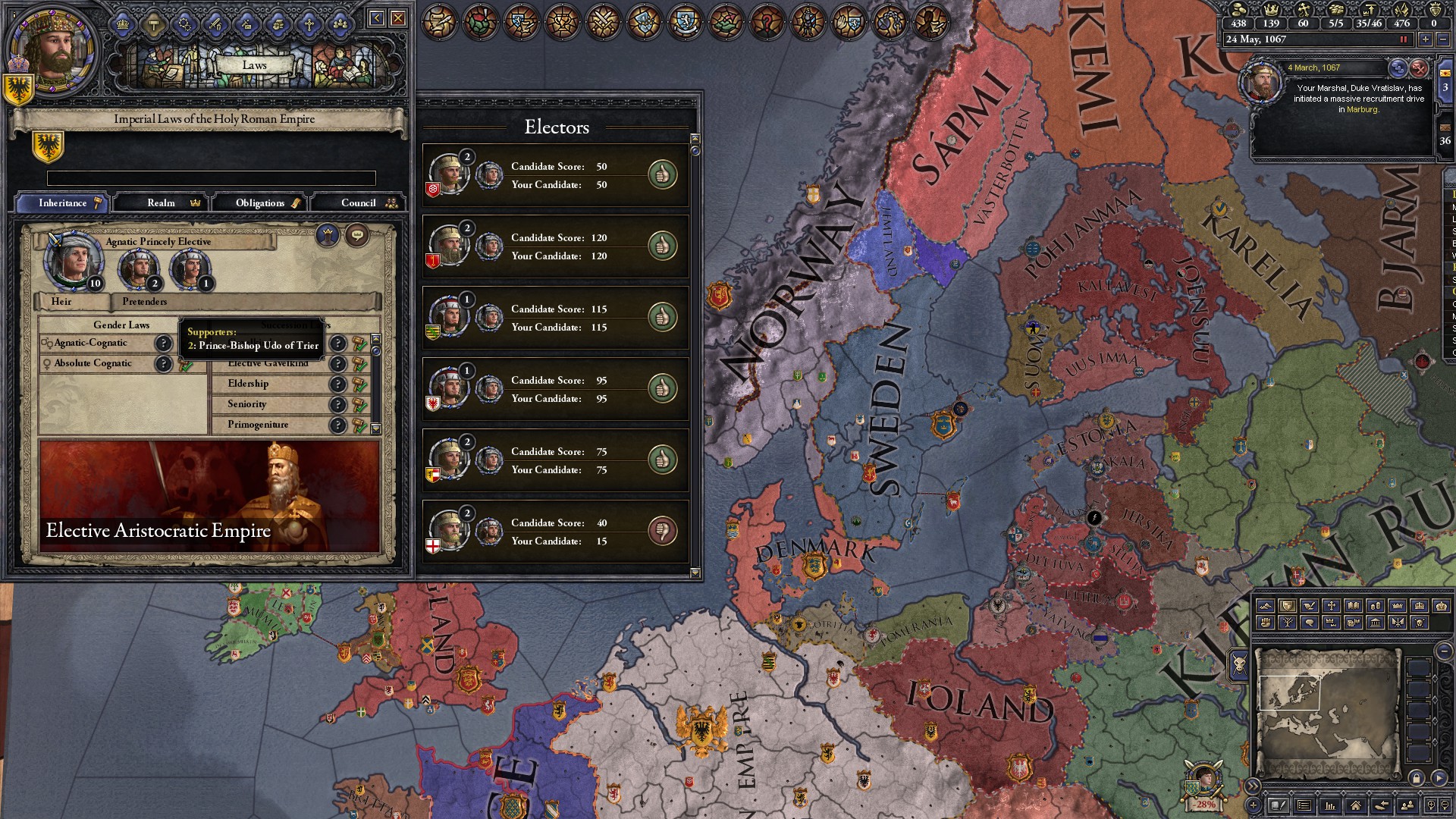
Electors under Princely Elective are overall much less likely to pick candidates that are either impious or of a different religion, and Theocratic Catholic Electors have twice as much voter strength than secular Electors whenever the Empire is under Papal Investiture.
While rulers of the Holy Roman Empire can still change the realm’s succession law as usual, the faction for Elective has been made much more easily accessible and palatable for vassals of the HRE and requirements to switch away from this succession have been made more restrictive (the ruler must have Max Centralization and either Absolute Crown Authority or Abolished Council Power).
Imperial Elective
And finally, a completely new succession law has been scripted for the Byzantine (and Roman) Empire, to better represent the peculiar politics of this realm. This succession has been tied to the two titles and is now also the *only* succession law that they have available. There are several features that are unique to this succession law, so I will explain it in sections:

Successors: Potential candidates under Imperial Elective include the Emperor’s children and close family members (spouse included), any claimants to the title, the current Marshal, and any Commander under the Emperor, with mutilated characters being excluded. This is to represent the influence of the military over Byzantium and allow more historical instances of influential commanders becoming Emperors.
Imperial Court: The Emperor, all of his Councilors, and all of his Commanders are valid electors. As Byzantium was a centralized power, the Emperor will need to curry the favor of the most powerful members of his court to ensure that his dynasty continues to maintain the throne, rather than his vassals, like a Feudal ruler would.
Scaled Voting Power: And this is where things get really interesting. Imperial Elective uses to its full extent the new voter_power function of scripted elective, making sure that every elector has a different amount of influence, entirely dependent on his status in the court and his attributes. The Emperor’s vote starts out with a strength of 200 voting power, which can be further boosted by good diplomacy and martial scores, making it so that a powerful and influential Emperor will be able to push the candidate that he wants on the throne even if most of the Court is against it. Conversely, if the Emperor is not Born in the Purple, deformed or crippled, or if he has made a reputation of appointing sycophants in his court (more on that below), he will see his voting power plummet. The other Electors have their own variable voting power, tied to prestige, rank and attributes (a Steward with high stewardship is more influential than an incompetent one). As such, appointing competent people to be your councilors and commanders will not only mean that your favorite son will have to compete with more competent and palatable candidates, but also that the electors will have a greater influence over the succession. Finally, minor titles can also affect a character’s voting power, so you might want to think a bit more before giving out your Caesar and Sebastokrator spots.
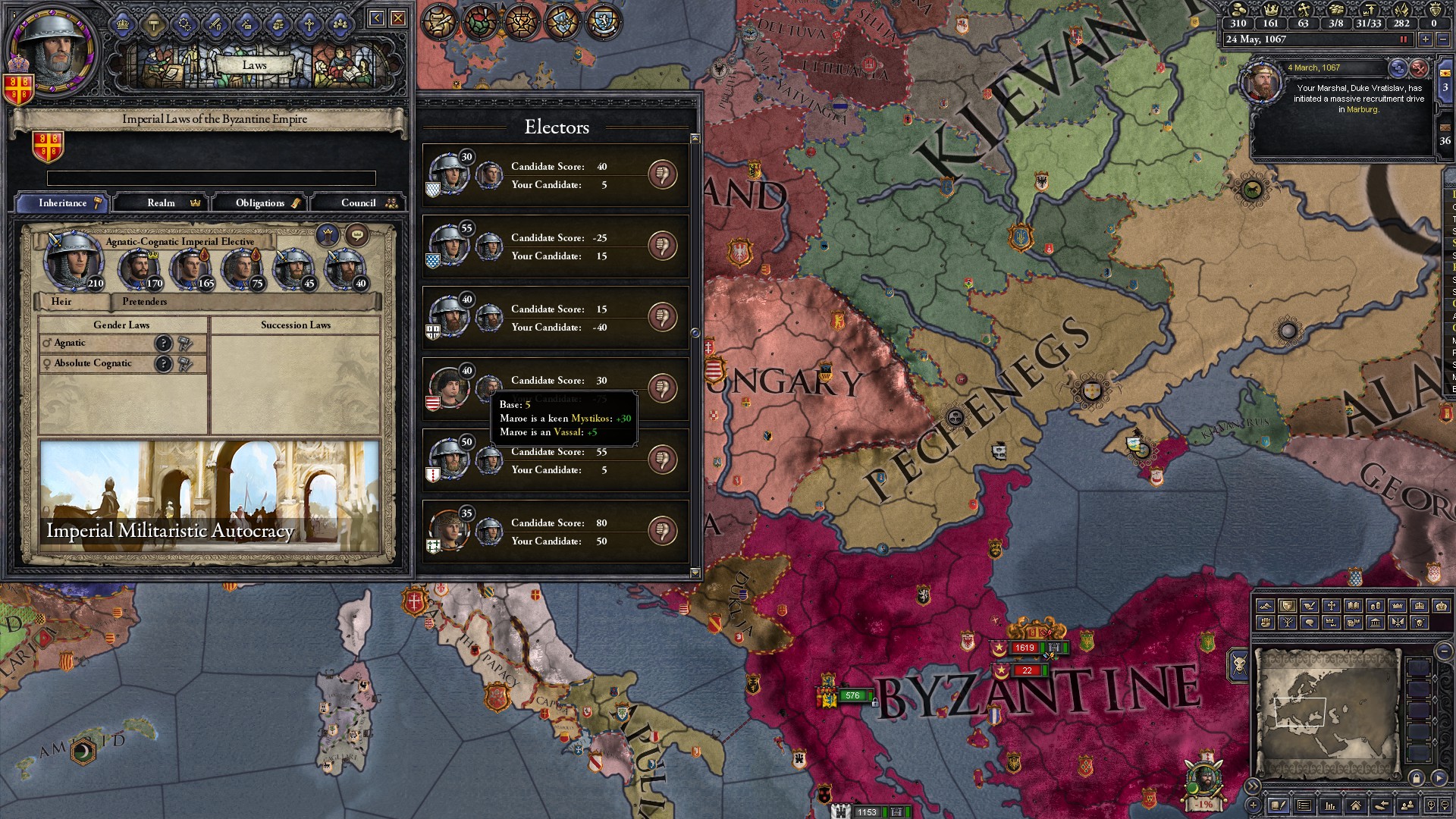
Heroes and Sycophants: Is Belisarius too popular a Commander for your sons to compete with him? Well, you can always discharge him: take away his status as Commander and he will no longer be a potential candidate or an elector, problem solved. Except... when under Imperial Elective, removing a competent Commander or Councilor from his position reduces the Emperor’s voting power of an amount proportional to the competence of the character you are removing. The more competent people the Emperor pushes out of his court, the less his vote will be worth overall. Same applies whenever an Emperor appoints a commander with poor martial score while there are clearly superior choices available: the court will notice that you are appointing mediocre sycophants because you fear competition and you will see your voting power go down. Additionally, Imperial Elective prevents Emperors from appointing landless commanders for as long as potential vassals are available to take the spot. If you wish that high-martial courtier to lead your armies, you will need to give him a proper title first.
Prestige and Ageism: This is not Feudal Elective, the Empire does not care as much about family ties and character traits, it cares about placing a competent and prestigious leader upon the throne. For the Byzantine Empire, this translates to the electors tending to favor skilled high-Intrigue characters, whereas the Roman Empire electors are keener on good orators (high Diplomacy). In both Empires, the electors will always favor people that are competent at their job, that have high prestige and titles (both minor and landed). One of the most visible consequences of this is that hardly anyone under Imperial Elective will ever consider a child to be a valid successor to the throne. If you wish your son to take your place, you will have to groom him first, wait for him to become adult, then push his bid to your Empire, possibly giving him a few honorary and landed titles along the way. While he’s still a toddler, it might be more sensible for you to appoint your younger brother, or your old uncle as preferred heir, just in case something happens before the little Prince comes of age...

Strong Claim Duel
Somewhat related to all these new succession forms, we have also added a new type of duel designed to let players keep their realms together after an Elective Gavelkind succession. This Strong Claim Duel is available regardless of whether you have the War Focus active, or if you are a member of a Warrior Lodge (which is otherwise required for regular dueling). As a tribal character, with a Strong Claim on a title currently held by a tribal ruler, it will be possible to issue a challenge to the current title holder, with the requirement of your target ruler either being independent, or both of you being vassals under the same liege. Bear in mind that the stakes in these duels are high, and losing does not only mean you give up your claims - unless you have a particularly kind opponent, who loves you dearly, death is the common way out of this dispute. Winning, on the other hand, means that you take the title in question and any vassals that come with it, along with any other of their titles on which you have a Strong Claim.
If the target of your Claim Duel happens to be an AI character of your own Dynasty, losing will present players with a choice: accept your fate, or click the option to take over as the character who won the duel, and continue to play the game as the kinsman (or woman) who bested you.

Well then, this is going to be a long one...
The old elective succession system has been succeeded
So your cousin the Duke of Burgundy always seem to nominate the Steve ‘the drunkard’ as the next Emperor of the realm rather than your favorite quick and attractive son. This has been a common theme for a bunch of our playthroughs while having the elective succession laws active for our main titles. One of the biggest problems about this is that the other electors reasonings for their nomination decisions has been hidden away in an opaque box so you never know which electors can be influenced to see things more in your way.
This was one of the first problems we wanted to address when we decided to rework the elective succession system. So instead of just giving you a list of names in the tooltips for whom casted votes on a given candidate we made a specific interface to enable us to give you a more detailed view into the minds of the powerful electors of the realm.
After it was possible to get a better look at why the electors made their decisions we wanted to make it easier to further edit the underlying factors which governs the AI. Therefor we decided to replicate the old logic from hardcoded conditions to instead be based on a scripted system which decides various rules of how the elective succession works.
This not only enables modding of the elective succession law, we now also allow you to create any number of your own elective rules to fill the world with different electorates that play by their own criterias. Maybe you always wanted to create your own technocratic republic that is governed only by the most learned people of the realm. The party realm might only allow drunkards and hedonists to have a say in whom should be this years party host.
For the people that are more interested in exactly how this is modifiable there’s a brief rundown of the syntax used to define the elective rules here:
Code:
### Condensed syntax layout:
#<elective_law_type> = {
# candidate_vote_score = {
# <Weight Modifiers>
# }
# elector_selection = {
# max_amount = <int>
# <Weight Modifiers> - if max_amount is set it will pick the X amount of top scorers.
# Negative scores are considered invalid electors - Ruler is always an elector
# }
# elector_vote_strength = {
# <Weight Modifiers>
# }
# elector_stances = { - Intended for the elder council positions
# <stance_name> = {
# icon = <int>
# <Weight Modifiers>
# }
# }
# candidate_trigger = {
# <trigger>
# }
#}
# <Weight Modifiers> - denotes a field of an arbitrary amount of triggered value modifiers eg.
# additive_modifier = {
# value = -4
# is_tribal = yes
# }
#
# <trigger> - denotes a field of conditions that needs to be evaluate true for the trigger to be fulfilled
#
# The elector will vote for the candidate with the highest score given by candidate_vote_score
# The electors are selected from the pool of characters which get a non-negative elector_selection score until we reach the max_amount
# elector_vote_strength will determine how much weight the vote of a single elector carries
# The elector will use the elector_stance with the highest score if any are scripted
# The stances are thought to be some kind of common thought process or allegiance for a subgroup of the electors - This system is used to create the different states for how the Elders will behave in the Eldership succession law explained in detail belowIn addition to these underlying code changes of the elective succession forms we also added another usage of the Conclave favors so that you now can force electors to vote in compliance with your vote for the succession of a title.
Revamped Elective Laws
The unhardcoding of Elective successions allowed us to completely rewrite the AI behavior for the existing Elective laws accessible through the base game (Feudal Elective, Elective Gavelkind, Tanistry). The various conditions to be eligible as a successor or elector under these laws have remained unchanged (although now they have been translated into moddable script), while the AI electoral behavior has been rewritten into a long list of nuanced modifiers. You can now expect Electors to take into account how much they like a candidate, how legitimate they think his claim his to the title, and how much they trust the ruler that is voting for said candidate. Age, titles, character traits, culture, religion, dynastic ties and much more are now all taken into consideration by the AI and visible to the player when using the new Electors’ Tab. The sum of all these modifiers will result in a voting score, and the potential candidate who has the highest voting score will be the one selected by the Elector in question (and since each Elector has a different personality/status/etc. different kinds of Electors will prefer different kinds of candidates).

The Electors Tab shows to the player the complete list of Electors casting their vote, who they are voting for, the reasons why they are voting for said characters as well as a comparison with the candidate score of the ruler’s preferred candidate and the reasons why they are not voting for him.

Eldership
Somewhat similar to Tanistry, Eldership prevents your title from ever falling outside a ruler’s family, restricting the choice of potential candidates to members of the ruler’s dynasty. Under Eldership, only the six oldest and most learned characters in the realm will be allowed to pick the ruler’s successor. Each Elder can hold one of three possible stances at any given time, depending on how he feels about the ruler: Displeased, Pleased, or Ecstatic.
Making sure that your Elders have a high opinion of you, giving them their preferred Council positions (Chancellor, Steward, Chaplain), or fulfilling the occasional request from them, will push them further to become Ecstatic.

An Ecstatic Elder will almost always vote for the ruler’s chosen candidate, almost never make demands, and even give the occasional piece of advice to make you a better person.

Pleased Elders will try to vote for what they consider to be good and capable candidates amongst the members of your dynasty, favoring older characters with high stewardship. They might occasionally make some demands, such as asking a ruler to give some land to a family member that they really like, but they will, for the most part, be reasonable people to deal with.
Displeased Elders on the other hand, will be much harder to deal with. Not only will they purposefully select bad candidates, they will occasionally grant claims on your title to people that they like, openly questioning their liege’s right to rule.

Holy Fury will allow the Baltic and African realms to start with Eldership as default succession law, rather than Elective Gavelkind. Additionally, other pagans can unlock this succession by picking the right Doctrine when they Reform their faith.
Princely Elective
This new variation on elective has been scripted to replace Feudal Elective for the Holy Roman Empire. This succession limits the electors to a maximum of seven (plus the ruling Emperor) and makes it so the historical titles held by the Prince-Electors are prioritized when determining the valid electors in the Empire, these titles being the Bishoprics of Mainz, Koln and Trier, and the Duchies of Bohemia, Franconia, Saxony, and Brandenburg. If an elector title does not exist or his held by the Emperor, another valid Duke will replace it (prioritizing dejure vassals of the same religion as the ruling Emperor).

Electors under Princely Elective are overall much less likely to pick candidates that are either impious or of a different religion, and Theocratic Catholic Electors have twice as much voter strength than secular Electors whenever the Empire is under Papal Investiture.
While rulers of the Holy Roman Empire can still change the realm’s succession law as usual, the faction for Elective has been made much more easily accessible and palatable for vassals of the HRE and requirements to switch away from this succession have been made more restrictive (the ruler must have Max Centralization and either Absolute Crown Authority or Abolished Council Power).
Imperial Elective
And finally, a completely new succession law has been scripted for the Byzantine (and Roman) Empire, to better represent the peculiar politics of this realm. This succession has been tied to the two titles and is now also the *only* succession law that they have available. There are several features that are unique to this succession law, so I will explain it in sections:

Successors: Potential candidates under Imperial Elective include the Emperor’s children and close family members (spouse included), any claimants to the title, the current Marshal, and any Commander under the Emperor, with mutilated characters being excluded. This is to represent the influence of the military over Byzantium and allow more historical instances of influential commanders becoming Emperors.
Imperial Court: The Emperor, all of his Councilors, and all of his Commanders are valid electors. As Byzantium was a centralized power, the Emperor will need to curry the favor of the most powerful members of his court to ensure that his dynasty continues to maintain the throne, rather than his vassals, like a Feudal ruler would.
Scaled Voting Power: And this is where things get really interesting. Imperial Elective uses to its full extent the new voter_power function of scripted elective, making sure that every elector has a different amount of influence, entirely dependent on his status in the court and his attributes. The Emperor’s vote starts out with a strength of 200 voting power, which can be further boosted by good diplomacy and martial scores, making it so that a powerful and influential Emperor will be able to push the candidate that he wants on the throne even if most of the Court is against it. Conversely, if the Emperor is not Born in the Purple, deformed or crippled, or if he has made a reputation of appointing sycophants in his court (more on that below), he will see his voting power plummet. The other Electors have their own variable voting power, tied to prestige, rank and attributes (a Steward with high stewardship is more influential than an incompetent one). As such, appointing competent people to be your councilors and commanders will not only mean that your favorite son will have to compete with more competent and palatable candidates, but also that the electors will have a greater influence over the succession. Finally, minor titles can also affect a character’s voting power, so you might want to think a bit more before giving out your Caesar and Sebastokrator spots.

Heroes and Sycophants: Is Belisarius too popular a Commander for your sons to compete with him? Well, you can always discharge him: take away his status as Commander and he will no longer be a potential candidate or an elector, problem solved. Except... when under Imperial Elective, removing a competent Commander or Councilor from his position reduces the Emperor’s voting power of an amount proportional to the competence of the character you are removing. The more competent people the Emperor pushes out of his court, the less his vote will be worth overall. Same applies whenever an Emperor appoints a commander with poor martial score while there are clearly superior choices available: the court will notice that you are appointing mediocre sycophants because you fear competition and you will see your voting power go down. Additionally, Imperial Elective prevents Emperors from appointing landless commanders for as long as potential vassals are available to take the spot. If you wish that high-martial courtier to lead your armies, you will need to give him a proper title first.
Prestige and Ageism: This is not Feudal Elective, the Empire does not care as much about family ties and character traits, it cares about placing a competent and prestigious leader upon the throne. For the Byzantine Empire, this translates to the electors tending to favor skilled high-Intrigue characters, whereas the Roman Empire electors are keener on good orators (high Diplomacy). In both Empires, the electors will always favor people that are competent at their job, that have high prestige and titles (both minor and landed). One of the most visible consequences of this is that hardly anyone under Imperial Elective will ever consider a child to be a valid successor to the throne. If you wish your son to take your place, you will have to groom him first, wait for him to become adult, then push his bid to your Empire, possibly giving him a few honorary and landed titles along the way. While he’s still a toddler, it might be more sensible for you to appoint your younger brother, or your old uncle as preferred heir, just in case something happens before the little Prince comes of age...

Strong Claim Duel
Somewhat related to all these new succession forms, we have also added a new type of duel designed to let players keep their realms together after an Elective Gavelkind succession. This Strong Claim Duel is available regardless of whether you have the War Focus active, or if you are a member of a Warrior Lodge (which is otherwise required for regular dueling). As a tribal character, with a Strong Claim on a title currently held by a tribal ruler, it will be possible to issue a challenge to the current title holder, with the requirement of your target ruler either being independent, or both of you being vassals under the same liege. Bear in mind that the stakes in these duels are high, and losing does not only mean you give up your claims - unless you have a particularly kind opponent, who loves you dearly, death is the common way out of this dispute. Winning, on the other hand, means that you take the title in question and any vassals that come with it, along with any other of their titles on which you have a Strong Claim.
If the target of your Claim Duel happens to be an AI character of your own Dynasty, losing will present players with a choice: accept your fate, or click the option to take over as the character who won the duel, and continue to play the game as the kinsman (or woman) who bested you.



